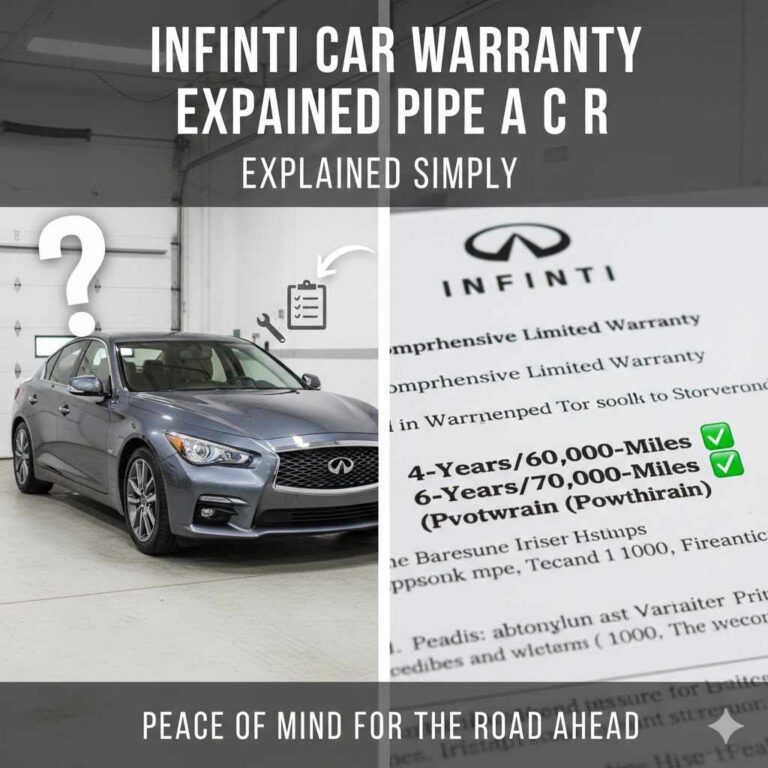What Does a Recall on a Car Mean?: Essential Insights
A recall on a car means that the manufacturer has identified a safety-related defect in the vehicle and is taking action to correct it. This can involve repairing the vehicle or part at no cost to the owner, replacing the vehicle with another identical or similar model if the issue cannot be fixed, or providing some other form of remedy.
It is important for car owners to respond to recalls promptly to ensure their safety and the proper functioning of their vehicle. Ignoring a recall can have legal and insurance consequences, as well as potential risks to the driver and passengers.
Introduction To Car Recalls
|
A car recall occurs when the manufacturer or their agent determines that a certain vehicle has a safety-related defect. This defect poses a potential risk to the driver, passengers, or other road users. In such cases, the manufacturer issues a recall notice, notifying the owners about the specific safety issue. When a car is recalled, the manufacturer is legally obligated to choose one of three options to correct the issue:
It is important for car owners to take recalls seriously and act promptly. Ignoring a recall can have serious consequences, including legal ramifications, injuries, higher insurance rates, and claim denials. The duration of recall repairs can vary depending on the complexity of the issue, ranging from a few hours to several days. Ultimately, car recalls are a safety measure designed to protect consumers and ensure that vehicles are in proper working condition. |
The Recall Process
When a car is recalled, it means the manufacturer has identified a safety-related defect. The manufacturer is responsible for addressing the issue, either by repairing the vehicle at no cost, providing a replacement, or issuing a refund. Vehicle owners are notified about the recall and should take immediate action to ensure their safety.
Common Reasons For Recalls
Common Reasons for Recalls:
Safety Defects and Malfunctions: Car recalls are often issued due to safety defects and malfunctions that can pose a risk to the driver, passengers, and other road users. These defects can include issues with the brakes, airbags, steering system, or electrical components. Manufacturers are legally required to repair or replace these faulty parts at no cost to the owner.
Non-Compliance with Standards: Another reason for car recalls is non-compliance with safety standards set by regulatory authorities. These standards ensure that vehicles meet certain criteria for performance, emissions, and safety. If a manufacturer fails to meet these standards, they may issue a recall to rectify the issue and bring the vehicle into compliance.
Recalls are important for maintaining the safety and integrity of vehicles on the road. It is crucial for car owners to stay informed about any recalls affecting their vehicles and take prompt action to address the identified issues. By doing so, they can ensure their safety and the safety of others while driving.
Recall Remedies
When a car is recalled, the manufacturer must take action to correct the safety issue. The options include repairing the vehicle or part at no cost, providing a replacement vehicle, or offering a refund. The duration of recall repairs can vary depending on the complexity of the issue, ranging from a few hours to several days. Ignoring a recall can have serious consequences, such as legal ramifications, injuries, and higher insurance rates. It’s important to address recalls promptly to ensure the safety of the vehicle and its occupants.
Consumer Actions
When a car is recalled, it means the manufacturer has identified a safety-related defect. Upon receiving a recall notice, consumers should take immediate action. Responding to a recall notice involves contacting the manufacturer or dealership to schedule the necessary repair. It’s crucial for consumers to prioritize safety precautions and address the recall promptly. Ignoring a recall can lead to legal ramifications, injuries, and higher insurance rates. The duration of recall repairs varies based on the complexity of the issue, ranging from a few hours to several days. Whether purchasing a car or owning one, staying informed about recalls is essential for ensuring vehicle safety.
Buying A Recalled Vehicle
When considering buying a recalled vehicle, it’s important to understand what a recall on a car means. A recall indicates that the manufacturer has identified a safety-related defect and must offer repair or replacement options to affected owners. It’s crucial to address recalls promptly to ensure the vehicle’s safety.
| Buying a Recalled Vehicle |
| Considerations and Risks |
| Buying a car that has been recalled can be risky, but it is not necessarily a bad decision. It is important to do your research and understand the risks involved before making a purchase. |
| Pre-Purchase Checks |
| Before buying a recalled vehicle, check with the manufacturer to see if the necessary repairs have been made. You can also check with the National Highway Traffic Safety Administration (NHTSA) to see if the recall has been completed. |
| If the recall has not been completed, consider the potential risks associated with the defect. It is important to weigh the risks versus the benefits of purchasing the vehicle. |
| Conclusion |
| Buying a recalled vehicle can be a good decision if you do your research and understand the risks involved. Make sure to check with the manufacturer and the NHTSA before making a purchase. Weigh the risks versus the benefits before deciding if the car is right for you. |
Recall Duration And Logistics
When a car is recalled, it means the manufacturer has identified a safety-related defect in the vehicle. The recall duration and logistics for repairs can vary, from a few hours to several days, depending on the complexity of the issue.
Ignoring a car recall can lead to legal and safety implications, making it essential to address promptly.
| Recall Duration and Logistics |
| Timeframes for Fixes |
| When a car is recalled, the manufacturer is required by law to offer a solution to the problem. The duration of recall repairs can range from a few hours to several days, depending on the type of recall. Simple fixes like replacing a faulty part may only take a few hours, while more complex repairs like those involving the transmission or engine may take several days. |
| Coordination with Dealerships |
| Manufacturers work with authorized dealerships to coordinate recall repairs. Once a recall is issued, the manufacturer will notify the dealership and provide them with the necessary parts and instructions for the repair. It’s important for car owners to contact their dealership as soon as possible to schedule the recall repair and ensure their safety on the road. |
Ignoring A Recall
When a car is recalled, it means the manufacturer has identified a safety-related defect. Ignoring a recall can lead to legal and insurance consequences. If you disregard a recall, you might face legal ramifications and potential injuries. Moreover, it could result in higher insurance rates and claim denials. It’s important to take recall notices seriously and promptly address the issue to ensure the safety of your vehicle and others on the road.
Key Takeaways
When a car is recalled, it means the manufacturer has identified a safety-related defect in the vehicle. It’s essential to stay informed on recalls to ensure the maintaining vehicle safety. In case of a recall, the manufacturer is required by law to repair or replace the affected parts at no cost to the owner. The duration of recall repairs varies depending on the complexity of the issue, but ignoring a recall can lead to legal and safety consequences. It’s advisable to address recalls promptly to mitigate potential risks. When considering a vehicle purchase, it’s important to check for any outstanding recalls and ensure they have been addressed before making a decision.
Conclusion
A recall on a car means that the manufacturer has identified a safety-related issue with a particular make and model and is taking steps to address it. This can involve repairing or replacing the affected vehicle or part at no cost to the owner.
It is important to take action promptly when notified of a recall to ensure the safety of yourself and others on the road. Ignoring a recall can have serious consequences, including legal ramifications, injuries, and higher insurance rates. Always prioritize safety and take all necessary steps to address a recall on your vehicle.






